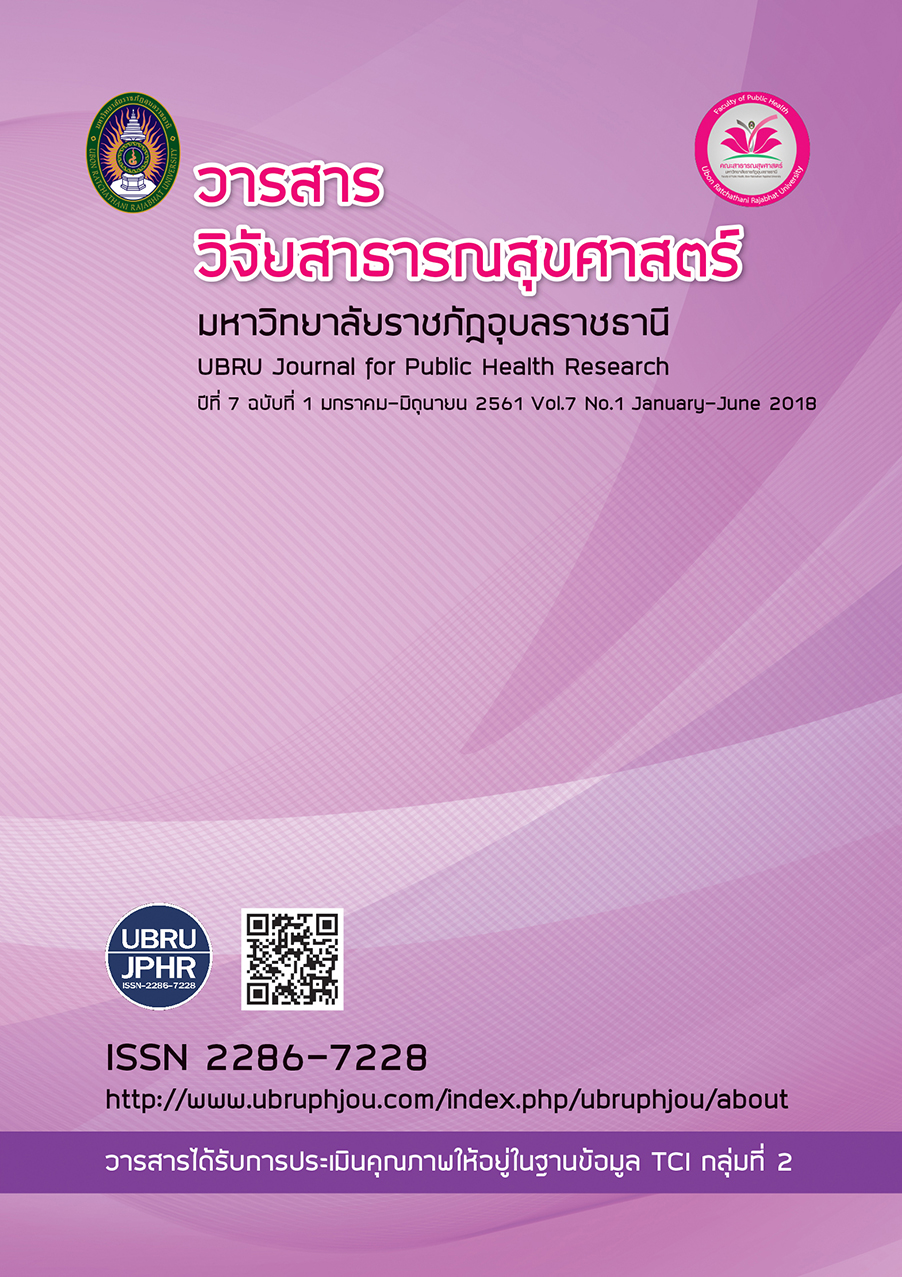Effects of empowerment program by using participation process and social support for family leadership in the prevention of dengue hemorrhagic fever in Kokkhong Subdistrict Municipality, Chanuman District, Amnat Charoen Province
Keywords:
Empowerment, social support, participation process, dengue hemorrhagic fever, family leadersAbstract
The research aimed to study the results of the empowerment program by using a participatory learning and social support in prevention of dengue hemorrhagic fever and compare behavior in participation in prevention of the disease in question, knowledge on dengue hemorrhagic fever, perception of the risks, awareness of the fever severity and an index of the prevalence of larvae of mosquitoes between the experimental group and the controlled group. The samples numbering 128 were family leaders in Tambon Kokkong of Chanuman district, Amnat Charoen province. They were derived by a cluster random sampling. The experimental group participated in the program for 8 weeks. The research instrument was divided into two sets. Set one was the empowerment program through the participatory learning social support in prevention of the dengue hemorrhagic fever for the family leaders. Set two was the instruments used to collect data. The instruments were the following: the test concerned with knowledge on the disease, which had a difficulty value from 0.30 to 0.78, a discrimination value from 0.45 to 0.97, a confidence value equivalent to 0.80; the test on perception of the risks to the diseases, which had a confidence value equivalent to 0.817; a test on perception of the disease severity with a confidence value equivalent to 0.808. There was also a test on the participation behavior in prevention of the dengue hemorrhagic fever with a confidence value equivalent to 0.703. Statistics used in data analysis were percentage, mean, standard deviation, and t-test. The research results were as follows (1) Participation of the family leaders who were given the program in the prevention of the dengue hemorrhagic fever was at the good level. (2)The family leaders who were given the program participated in the prevention of the disease more than their counterparts who were not given the program at a statistical significance of 0.05. (3) The family leaders who were given the program had a higher degree of perception of the disease, the potential risks and the severity of the disease than their counterparts who were not given the program at a statistical significance of 0.05 and (4) The index of the prevalence of larvae of mosquitoes of the families of the leaders who were given the program had BI, HI, and CI at a lower level.
References
จริยา ปัณฑวังกูร. (2549). การส่งเสริมสุขภาพ. พิมพ์ครั้งที่ 2. อุบลราชธานี : วิทยาการพิมพ์.
ชลธพร คงจำนงค์.(2553). ประสิทธิผลของโปรแกรมสุขศึกษาร่วมกับการให้แรงสนับสนุนทางสังคมโดยอาสาสมัคร สาธารณสุขประจำหมู่บ้าน ต่อความรู้ การรับรู้ พฤติกรรมการป้องกันและควบคุมโรค ไข้เลือดออกของแกนนำสุขภาพประจำครอบครัว ตำบลบึงกระจับ อำเภอวิเชียรบุรี จังหวัด
เพชรบูรณ์. การศึกษาอิสระสาธารณสุขศาสตรมหาบัณฑิต มหาวิทยาลัยนเรศวร.
เทศบาลตำบลโคกก่ง. (2560). ฐานข้อมูล Hos xp ของอำเภอชานุมาน จังหวัดอำนาจเจริญ. อำนาจเจริญ: เทศบาลตำบล.
ธีรพัฒน์ สุทธิประภา. (2547). ผลของการจัดกิจกรรมสุขศึกษาร่วมกับการให้แรงสนับสนุนทางสังคมต่อ ความรู้การรับรู้พฤติกรรมการป้องกันและควบคุมโรคไข้เลือดออก ของหมู่บ้านปกติ หมู่บ้านเสี่ยงปานกลางและหมู่บ้านเสี่ยงสูง ในจังหวัดกาฬสินธุ์. วิทยานิพนธ์สาธารณสุขศาสตรมหาบัณฑิต มหาวิทยาลัยมหาสารคาม.
พงษ์ศักดิ์ ธนวชิรกุล. (2550). ผลของโปรแกรมการสร้างพลังแกนนำชุมชนเพื่อป้องกันและควบคุมโรคไข้เลือดออก ตำบลโนนเมือง อำเภอขามสะแกแสง จังหวัดนครราชสีมา. วิทยานิพนธ์สาธารณสุขศาสตรมหาบัณฑิต มหาวิทยาลัยราชภัฏนครราชสีมา.
รุจิรา ดวงสงค์. (2549). การจัดการทางสุขศึกษาและการส่งเสริมสุขภาพ. ขอนแก่น: โรงพิมพ์มหาวิทยาลัยขอนแก่น.
วรรณะ ชูศรีขาว. (2553). ผลการประยุกต์ใช้โปรแกรมแรงจูงใจเพื่อป้องกันโรคร่วมกับกระบวนการสร้างพลังของแกนนำสุขภาพประจำครอบครัวที่มีต่อการควบคุมและป้องกันโรคไข้เลือดออก ตำบลเพี้ยราม อำเภอเมือง จังหวัดสุรินทร์. วิทยานิพนธ์สาธารณสุข ศาสตรมหาบัณฑิต มหาวิทยาลัยมหาสารคาม.
สำนักงานโรคติดต่อนำโดยแมลง กรมควบคุมโรค. (2558). สถานการณ์โรคไข้เลือดออกของประเทศไทยตั้งแต่ปี พ.ศ. 2501–2557. นนทบุรี: กรมควบคุมโรค.
อังศินันท์ อินทรกำแหง. (2552). การเปลี่ยนแปลงพฤติกรรมสุขภาพ. กรุงเทพฯ: สุขุมวิทการพิมพ์จำกัด,
อานนทพร มุกดาม่วงและปาริชา นิพพานนทน์. (2557). การประยุกต์ใช้ทฤษฎีแรงจูงใจป้องกันโรคร่วมกับแรงสนับสนุนทางสังคมในการป้องกันและควบคุมโรคไข้เลือดออกของตัวแทนครัวเรือน อำเภอชุมแพ จังหวัดขอนแก่น. วารสารวิจัยและพัฒนาระบบสุขภาพ. 7(2): 325-333.
Adisasmito, Wiku B. (1995). Sustainable Community Involvement for Controlling Aedes aegyti in Indonesia Potential Strategies (Dengue Hemorrhagic Fever). American Journal of Public Health. 15: 3148-B.
Downloads
Published
How to Cite
Issue
Section
License
เนื้อหาและข้อมูลในบทความที่ลงตีพิมพ์ในวารสารวารสารวิจัยสาธารณสุขศาสตร์ มหาวิทยาลัยราชภัฏอุบลราชธานี ถือเป็นข้อคิดเห็นและความรับผิดชอบของผู้เขียนบทความโดยตรงซึ่งกองบรรณาธิการวารสาร ไม่จำเป็นต้องเห็นด้วย หรือร่วมรับผิดชอบใดๆ
บทความ ข้อมูล เนื้อหา รูปภาพ ฯลฯ ที่ได้รับการตีพิมพ์ในวารสารนี้ ถือเป็นลิขสิทธิ์ของวารสารฯ หากบุคคลหรือหน่วยงานใดต้องการนำทั้งหมดหรือส่วนหนึ่งส่วนใดไปเผยแพร่ต่อหรือเพื่อกระทำการใดๆ จะต้องได้รับอนุญาตเป็นลายลักอักษรณ์จากบรรณาธิการวารสารนี้ก่อนเท่านั้น


